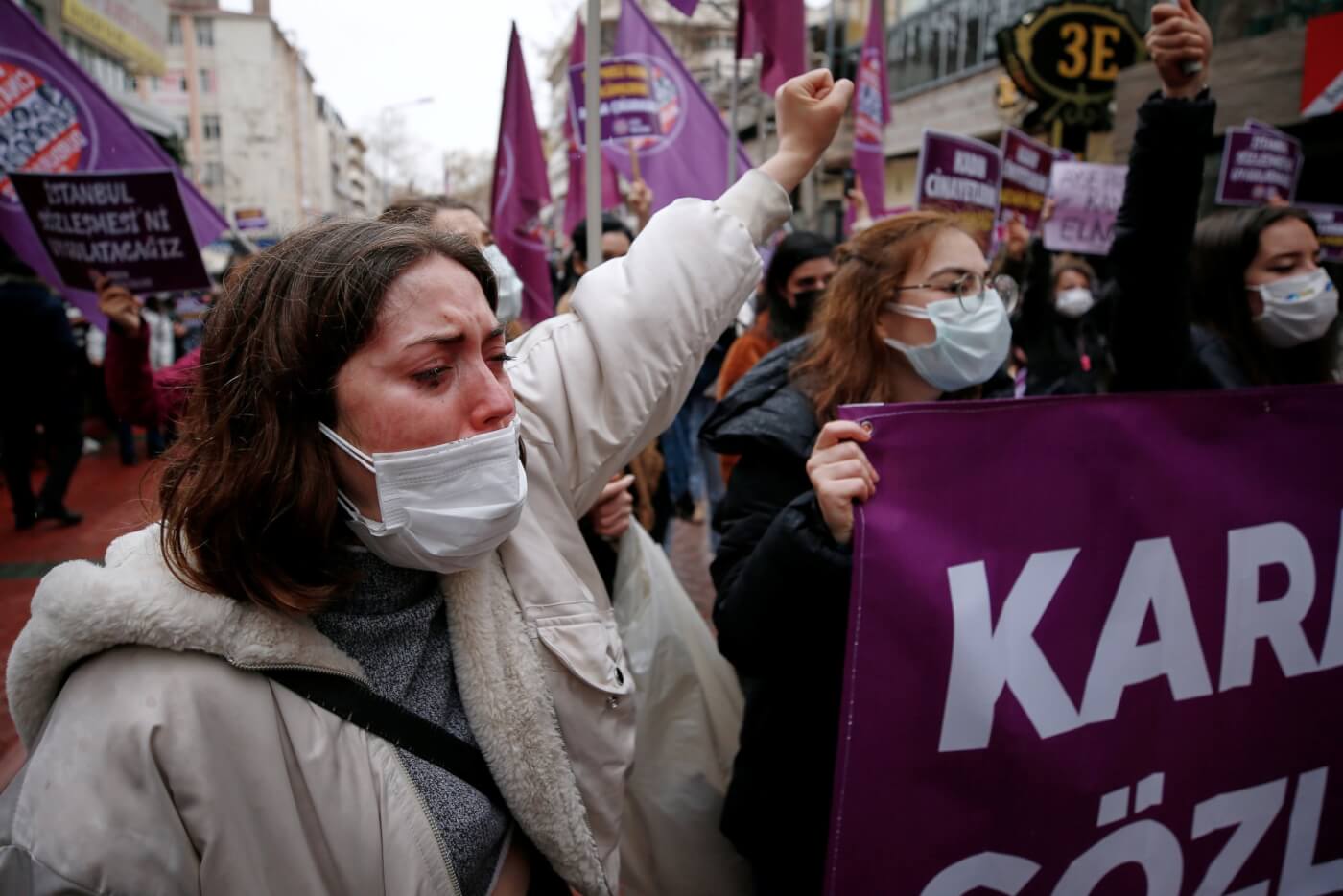President Erdoğan has dealt a blow to women’s rights by his withdrawal of Turkey from the landmark Council of Europe’s Istanbul Convention. The treaty was formed 10 years ago in Turkey’s largest city, Istanbul, and ratified by 45 countries when it came into force in 2012.
Turkey was the first country to ratify the treaty and is now also the first to leave. The Istanbul convention resulted in the world’s first binding treaty aimed at promoting gender equality. It prosecuted domestic violence, marital rape, female genital mutilation, as well as general violence against women.
Marija Pejčinović Burić, Secretary General of the Council of Europe, released a statement in response saying:
“..We thus deeply regret the decision of the President of Turkey to withdraw from this Convention widely supported in the country, without any parliamentary debate.
We recall that the purpose of the Convention is to prevent violence against women, protect victims and prosecute perpetrators. It upholds women’s fundamental human right to a life free from violence. Leaving the Convention would deprive Turkey and Turkish women of a vital tool to counter violence.
We therefore call on the Turkish authorities not to weaken the international system to protect women against violence put in place by the Istanbul Convention”
The decision to withdraw was made despite Turkey’s increasing numbers of Femicide. According to the human rights group, ‘We Will Stop Femicide Platform’, last year alone saw the documentation of 300 cases of femicide and 474 the year prior. These numbers are likely to be higher with many cases going unreported. The World Health Organisation released figures that showed 38 percent of women in Turkey are subject to domestic violence in their lifetime and 2020 saw the murder of 27 year old Pınar Gültekin, who was killed by an ex-boyfriend. After her remains were found in the woods of southwestern city Mugla, her death sparked conversation around women’s rights in Turkey. Women’s activists responded with a vigil in her name as well as street protest calling for a stop of femicide. Many shared the hashtags #ChallengeAccepted and #İstanbulSözleşmesiYaşatır (Istanbul Convention Saves Lives) on social media in order to raise awareness for women affected by domestic violence.
While no official reason was given for pulling out of the treaty, religious conservatives have stated that the legislation undermines Turkey’s traditional family values. This is due to the inclusion of LGBTQ+ rights, with signatories required to protect victims regardless of sexual orientation or gender identity.
As a response to the outrage, the Turkish presidency’s directorate of communications issued a statement outlining that the Istanbul Convention “…was hijacked by a group of people attempting to normalise homosexuality…”. While Turkey has a large Muslim population, it is officially secular. This decision seems to be a step towards a more socially conservative Turkey.
In recent months Turkey’s president Erdoğan has vowed to take active steps towards improving social freedom in Turkey in order to meet the EU standards. Turkey has been a candidate to join the EU since 2005; however, policy differences and Ankara’s human rights records have prevented this.
Hence, the decision to leave the treaty seems to be a step in the wrong direction. Commission President Ursula von der Leyen expressed her support for the treaty and called for all signatories to ratify the treaty, stating that, “Women deserve a strong legal framework to protect them”. This is because similar discussions surrounding the treaty have been made in Poland and because several European countries have not yet ratified the treaty, including the UK.
Germany’s foreign minister Heiko Maas, stated that Erdogan’s decision to leave the treaty was a “step backward and wrong signal to Europe”. Erdoğan’s decision also puts a further rift in Turkish-American relations. US president Biden condemned Turkey’s withdrawal from the treaty, calling it “sudden and unwarranted” as well as a:
“…disheartening step backward for the international movement to end violence against women globally.”
The women of Turkey responded to Erdoğan’s decision by taking to the streets of Istanbul in protest, many expressing fear for their future. Deputy chairperson of Turkey’s Republican People’s Party, Gokce Gokcen sent a tweet voicing her concerns about Turkey’s withdrawal from the treaty arguing that withdrawal meant “keeping women [as] second class citizens and letting them be killed”.
Furthermore, a coalition of women’s groups expressed their frustrations with Turkey’s government, publishing a statement which underlined their concerns. The coalition stated that, “It is obvious this withdrawal will empower murderers, abusers and rapists of women”. While Erdoğan has publicly condemned violence against women, stating that the government would take active steps to eradicate domestic violence, critics agree that Turkey’s government has not done enough to address its rising numbers of femicide and domestic violence. Instead the withdrawal seems to be an active step against gender equality.

